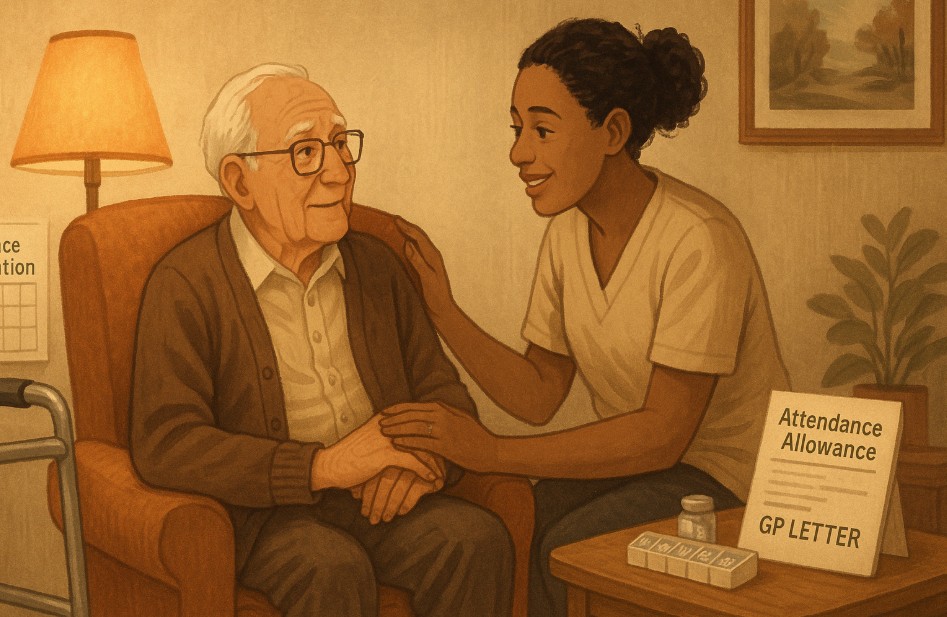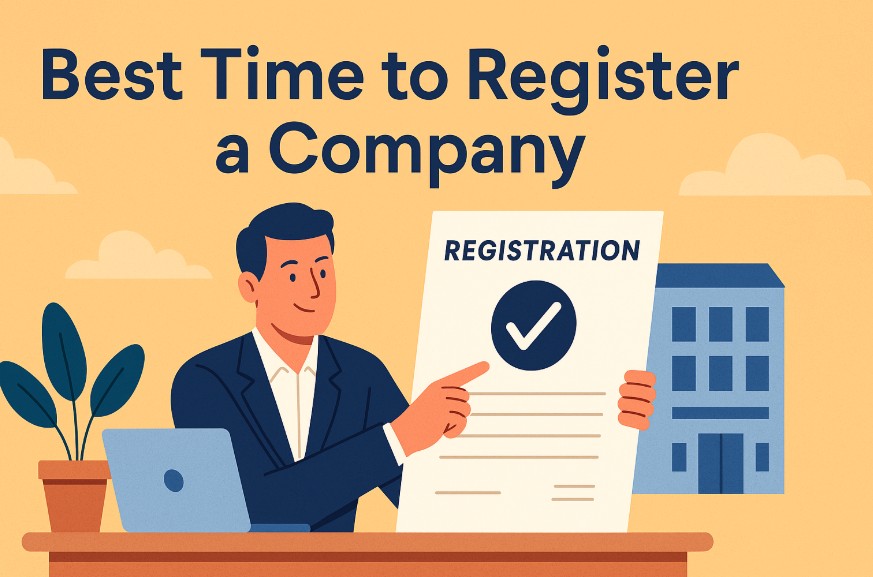Table of Contents
ToggleIt’s estimated that over 1.7 million older adults in the UK receive Attendance Allowance, yet thousands of eligible individuals never claim it. Many people wrongly assume they won’t qualify or that the benefit is only for those with severe physical impairments.
In reality, a broad range of conditions both physical and mental, can make you eligible. This article explores exactly what medical conditions qualify for Attendance Allowance, how the assessment works, and what to expect if you apply.
What Is Attendance Allowance in the UK?
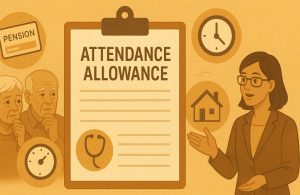
Attendance Allowance is a financial benefit aimed at supporting older adults with disabilities or long-term health conditions that affect their ability to look after themselves.
It is available to people who have reached the State Pension age and need help with personal care, such as bathing, dressing, eating, or monitoring due to mental or cognitive issues.
The benefit is tax-free and not based on income or savings, which means you can claim it regardless of your financial circumstances. Attendance Allowance is intended to help cover additional costs that come with needing care or supervision. It does not, however, include support for mobility needs.
This support is especially significant for those who are not receiving other disability benefits such as Personal Independence Payment (PIP), Disability Living Allowance (DLA), or Adult Disability Payment (ADP).
For individuals nearing the end of life due to a terminal illness, a separate application process is available to ensure faster access to higher-rate support without the standard assessment period.
Attendance Allowance information is also made accessible through various formats, including Welsh (Cymraeg), British Sign Language (BSL), and Easy Read versions, ensuring everyone has equal access to understanding their entitlement.
Who Is Eligible to Claim Attendance Allowance?
Eligibility for Attendance Allowance depends on several criteria. First and foremost, the applicant must have reached the State Pension age. Beyond that, the focus is on the care needs resulting from a physical disability, mental health issue, or long-term illness.
This includes conditions that affect personal safety, communication, memory, or the ability to manage daily routines without assistance.
Applicants must have required help for at least six months unless they are terminally ill. A diagnosis is not strictly necessary; what matters most is how the condition affects daily life.
Claimants must be living in Great Britain and have been present in the UK for at least two of the past three years. Certain exceptions apply to members of the armed forces or individuals under humanitarian protection.
It’s also essential that applicants are not receiving other overlapping benefits such as PIP or DLA, as these already provide similar support.
What Medical Conditions Qualify for Attendance Allowance?
Attendance Allowance isn’t awarded based solely on a diagnosis. Instead, the assessment is focused on how a condition affects a person’s ability to manage personal care or safety.
That being said, there are medical conditions that frequently lead to successful claims because they often require a degree of help or supervision.
1. Physical Conditions
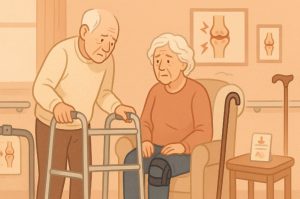
Chronic physical illnesses and injuries that lead to a loss of independence are among the most common reasons people apply. Arthritis, for instance, is the most cited condition among claimants.
It limits mobility, affects the ability to carry out basic hygiene tasks, and can cause significant discomfort that interferes with daily life.
Stroke survivors often experience long-term effects such as weakness, cognitive changes, and speech difficulties. These complications can require constant monitoring or physical support.
Other physical health problems that frequently qualify include multiple sclerosis, chronic obstructive pulmonary disease (COPD), and osteoporosis, especially when combined with frailty or risk of falls.
2. Sensory Impairments
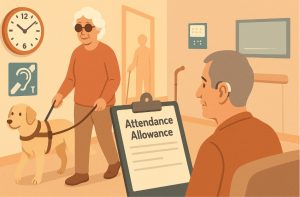
Severe visual or hearing impairments can also lead to eligibility, particularly if they affect communication or safety. For example, someone who is blind or has profound hearing loss may need supervision or support to navigate their environment or communicate effectively.
3. Mental Health and Cognitive Conditions
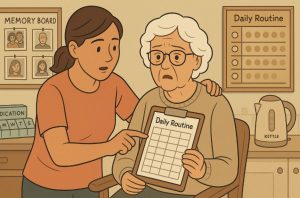
Mental health disorders, when severe, can justify a claim. Conditions such as schizophrenia, bipolar disorder, anxiety, or depression may not always be visible but can result in a significant need for supervision, prompting, or daily structure.
Cognitive conditions like Alzheimer’s disease and other forms of dementia are particularly common among Attendance Allowance recipients. These impairments often lead to disorientation, memory loss, and confusion, necessitating constant oversight.
4. Terminal Illness
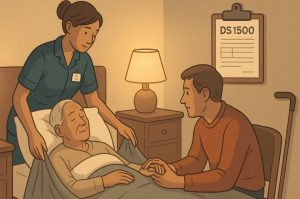
Those diagnosed with terminal illnesses, where a medical professional has stated that their life expectancy is six months or less, can apply under a special process. This allows for immediate higher-rate payments without needing to demonstrate the usual six-month care requirement.
Full List of Medical Conditions That Qualify for Attendance Allowance in 2025
A wide variety of conditions may make someone eligible for Attendance Allowance. The table below shows conditions with the most common claim rates, based on official data from May 2024:
| Medical Condition | Number of Claimants | Percentage of All Claims |
| Arthritis | 494,148 | 28.14% |
| Dementia | 206,385 | 11.76% |
| Heart disease | 127,343 | 7.30% |
| Respiratory disorders | 104,724 | 5.97% |
| Stroke (Cerebrovascular disease) | 79,046 | 4.50% |
| Cancer (Malignant disease) | 60,184 | 3.43% |
| Parkinson’s disease | 47,039 | 2.68% |
| Neurological diseases | 36,629 | 2.09% |
| Cognitive disorders | 24,587 | 1.40% |
| Diabetes, Multiple Sclerosis, Epilepsy | Various | <1.5% each |
Many other conditions also qualify, even if they are rare or less documented. The critical factor remains the level of personal care or supervision needed.
How Does the DWP Assess Eligibility?
The Department for Work and Pensions (DWP) assesses claims based on the applicant’s care needs rather than solely on medical diagnoses. They look at both day and night-time care requirements.
During the day, they assess whether the individual needs regular help with dressing, bathing, using the toilet, preparing food, or taking medication.
For the night-time assessment, they consider whether the individual needs someone to help them during the night or whether supervision is needed due to the risk of harm.
Applicants do not need to be receiving care from someone; the benefit is awarded based on the need for care. If a person lives alone and struggles, they may still be eligible.
How Do You Apply for Attendance Allowance?
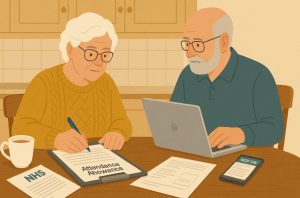
There are two main ways to apply for Attendance Allowance:
- Online: A new online application system has been launched, although it currently accepts only a limited number of applications each week.
- By Post: You can print the claim form from the official GOV.UK website or call the Attendance Allowance helpline to have one sent to you.
You’ll need to provide your National Insurance number, medical details, GP or specialist information, and explain how your condition affects your daily life.
After submitting the form, you’ll receive a letter confirming your application, and if necessary, a follow-up appointment for a medical assessment may be scheduled. Most decisions are made within 8 weeks.
How Much Is Attendance Allowance Per Month?
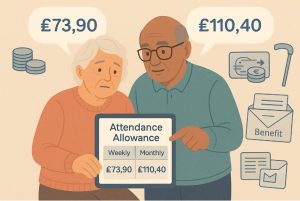
Attendance Allowance is paid at two different rates, and the amount you receive depends entirely on the level of help and supervision you require because of your health condition not on your income, savings, or whether someone currently provides care for you.
As of the 2024/2025 financial year, the payment rates are:
- Lower Rate: £73.90 per week
- Higher Rate: £110.40 per week
These weekly amounts translate approximately to:
- Lower Rate Monthly: around £295.60 per month
- Higher Rate Monthly: around £441.60 per month
The lower rate is awarded to individuals who need frequent help during the day or some level of supervision at night. For example, someone who needs assistance getting dressed in the morning or being reminded to take medication might be considered for this level.
The higher rate applies if the person needs support both day and night, or if they are considered to be in the final stages of a terminal illness.
This includes individuals who may need assistance getting to the toilet at night or supervision to ensure they don’t harm themselves or wander off due to confusion or cognitive impairment.
Unlike other benefits, Attendance Allowance is not means-tested. This means your earnings, pensions, and savings will not reduce the amount you receive. You do not even need a formal diagnosis, as long as the care needs are clear and ongoing.
Additionally, receiving Attendance Allowance can make you eligible for extra help through other benefits. For example:
- Pension Credit may increase
- You may qualify for Housing Benefit
- You could receive Council Tax Reduction
It’s important to check with your local benefits office or use the government’s benefits calculator to assess what additional support may be available if you’re awarded Attendance Allowance.
What Are the Common Pitfalls in Attendance Allowance Claims?
Many eligible individuals are denied Attendance Allowance, not because they don’t qualify, but because of mistakes made during the application process. Understanding these common pitfalls can greatly improve the chances of a successful claim.
1. Underreporting the Impact of Your Condition
One of the most frequent errors is not fully explaining how your condition affects your daily life. Applicants often downplay their difficulties, either out of pride or because they are so used to struggling that they no longer recognise how much help they actually need.
The application form asks detailed questions, and it’s essential to be honest and thorough. Instead of writing, “I manage okay,” it’s far better to specify: “I often fall when trying to get in and out of the bath and need help drying myself after a shower.”
2. Lack of Supporting Medical Evidence
Although not mandatory, including medical evidence can strengthen your claim. Letters from your GP, specialist, or even a care assessment from a social worker can demonstrate the severity and duration of your condition. Not including this may weaken your case, especially if the condition is not visibly disabling.
3. Leaving Sections of the Form Blank
The Attendance Allowance claim form is long and sometimes repetitive, but every question serves a purpose. Missing sections can raise questions or result in an incomplete picture of your needs. If a section doesn’t apply, it’s still better to state that clearly rather than leave it blank.
4. Assuming You Need a Carer to Qualify
Another widespread myth is that Attendance Allowance is only for people who already have a carer. In reality, the benefit is based on the need for care, not whether someone is currently providing it. Many older people who live alone qualify because they struggle with tasks but have not arranged formal care.
5. Failing to Report Changes in Circumstances
Once you’ve been awarded Attendance Allowance, you are required to notify the Department for Work and Pensions (DWP) if your circumstances change.
This might include a stay in hospital, moving into a care home, or a change in the level of help you need. Failing to report these changes can result in overpayments, which may need to be repaid, or your claim being reassessed incorrectly.
6. Applying Without Help When Needed
The application can be daunting, especially for those with cognitive difficulties or low literacy. If you’re unsure, it’s advisable to seek help from a family member, carer, GP surgery, or local charity such as Age UK or Citizens Advice.
These organisations often provide support to fill out the form correctly and highlight the most important aspects of your needs.
What Happens If You Live in Scotland?
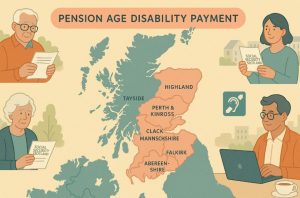
Scotland has introduced a replacement benefit known as Pension Age Disability Payment for individuals who meet the criteria for Attendance Allowance. This is gradually rolling out across various council areas. If you live in one of the regions where it is active, you must apply for this Scottish benefit instead.
If you are already receiving Attendance Allowance and live in one of the rollout areas, you do not need to reapply. Your case will automatically transition to the new Scottish system starting in spring 2025.
What If You Live Abroad or in a Care Home?
If you’re a UK national and live in a country within the European Economic Area or Switzerland, you may still be eligible for Attendance Allowance under certain conditions.
If you live in a care home and your care is funded by the local authority, you generally cannot receive Attendance Allowance. However, if you’re self-funding your care, you can still claim.
FAQs About Medical Conditions and Attendance Allowance
Can you claim Attendance Allowance without a carer?
Yes, you don’t need to have someone actively caring for you. It’s about whether you need help, not whether you receive it.
Do mental health conditions qualify?
Yes, mental health conditions like severe depression, anxiety, PTSD, or schizophrenia can qualify if they require prompting, supervision, or care.
What if you’re terminally ill?
Terminally ill individuals can apply using the fast-track process and receive the higher rate of Attendance Allowance without the standard waiting period.
Does Attendance Allowance affect other benefits?
It can increase eligibility for benefits like Pension Credit and Council Tax Reduction.
Can someone apply on my behalf?
Yes, an appointee or someone with Power of Attorney can apply on your behalf using a postal application.

